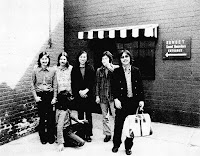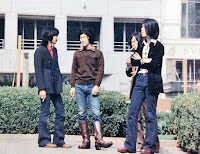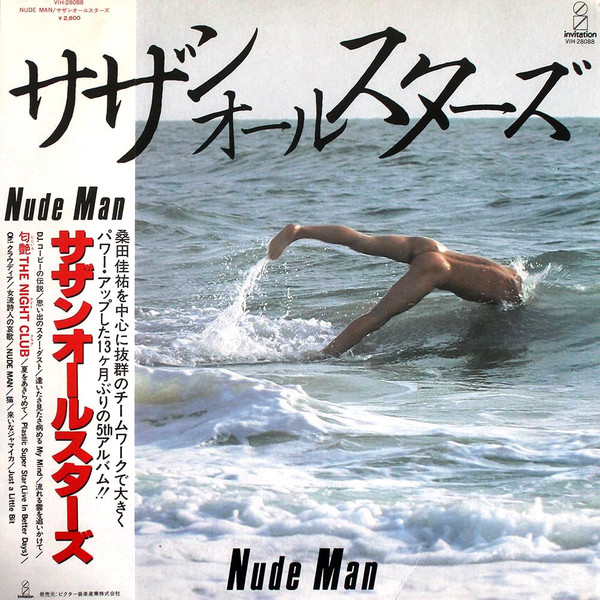
This year marks the 50th anniversary of Happy End, which's known as probably the most influential rock band in Japanese history. Composed of Haruomi "Harry" Hosono (細野 晴臣), Takashi Matsumoto (松本隆), Shigeru Suzuki (鈴木茂), and led by Eiichi Ohtaki ( 大瀧 詠一), the band's pioneering sound was regarded as avant-garde to most Japanese at the time. Even though they only had 3 albums (4 if you count Otaki's debut album), each one played an important role in the evolution of Japanese music, even to the point of controversy. There was a literal debate about whether it was okay to sing rock music in Japanese...even though they're Japanese. Most people will tell you that the best Happy End album is Kazemachi Roman (風街ろまん, "Windy City Romance"), hell it's even considered the greatest J-Rock album of all time. However my personal favorite is actually their final album from 1973, simply called Happy End, not just because the tracks on it are so different from the previous albums, but also because the story behind the production is both fascinating and bittersweet.
THE HISTORY
 |
When they walked into the studio, they met renowned producer Van Dyke Parks, who was also in the middle of recording his seminal album, Discovering America, with the help of the American rock band, Little Feat. When they interrupted their recording session, Parks originally turned them down, but then Happy End's manager stepped in and used the universal language to change his mind; a suitcase full of 100 dollar bills.
Apparently, the recording process was not the most pleasant experience. The creative opposition between the Los Angeles studio personnel and the band, on top of the already difficult language barrier, made working frustrating. To make matters worse, Van Dyke Parks did not leave a great first impression. On top of being high when they first met, Parks often drank during production, often lecturing them about Pearl Harbor and World War II. Talk about awkwardness! They thought he was crazy and wanted to stay as far away from him as possible.
On the bright side, they were able to collaborate with several notable session musicians such as Lowell George and Bill Payne of the band Little Feat. As well as Blues Brothers saxophonist Tom Scott. On top of that, they managed to learn many new recording techniques from Parks, which as Harry Hosono recalls, was very productive and inspiring:
"That was a really new experience for us. For example, their recording method was very western. It was very layered, let’s say. We learned that method. Before that our style was flat, like Japanese picture scrolls. We hadn’t thought about depth. We learned that from Parks."
- Harry Hosono
THE MUSIC
1) 風来坊|(The Wanderer): A song written by Hosono, about a vagabond tirelessly wandering an unknown land. The melody concocted is a folk-rock twist on the nursery rhyme, "Who's Afraid of The Big Bad Wolf". Harry's soothing bass accompanied by the lively trumpet playing help make for a very mellow track.
2) 氷雨月のスケッチ| (A Sketch of 'Ice Storm Month): A chilling country-rock ballad sung by Suzuki with some psychedelic rock smudges to it.
3) 明日あたりはきっと春| (It Will Surely Be Spring Tomorrow): A beautiful jazzy folk tune about the coming of spring. Suzuki's vocal harmonies and soothing saxophone really add to the song's atmosphere.
4) 無風状態 | (Windless): Another, a bit slow and grungier, psychedelic folk song sung by Hosono, with a cool wah-wah guitar solo towards the end.
5)さよなら通り3番地 | (Goodbye 3rd Street): A country-rock tune inspired by The Band.
7) 田舎道 | (Country Road): Eiichi Ohtaki finally takes the lead with the most danceable song on the album, at least if you know how to square dance. It's a classing-sounding style country dance tune with some catchy guitar riffs and awesome piano work. Plus, Ohtaki's enthusiastic yodeling is also something to behold.
8) 外はいい天気 | (It's Nice Out): A much more chamber pop-influenced ballad.
9) さよならアメリカ,さよならニッポン | Goodbye America, Goodbye Japan: A musical collaboration between Van Dyke Parks & Ohtaki with the lyrics written by Matsumoto. With their initial vision of America finally broken, the band conveys their feelings in the closing track with one simple phrase chanted throughout a calypso-inspired folk tune. As Matsumoto explained: "We had already given up on Japan, and with [that song], we were saying bye-bye to America too—we weren't going to belong to any place."
THE VERDICT ⭐⭐⭐⭐
Unfortunately, it's obvious that Ohtaki used all of his best songs for his solo album since it doesn't seem like he brought his A-game for this record. Besides Country Road, which is my second favorite song, the other two final tracks he wrote are easily the weakest on the album. Sayonara America, Sayonara Japan is a nice symbolic closure and it has a catchy beat, but outside of that it's not something that I would listen to causally on its own, and It's Nice Out feels too short and repetitive to enjoy fully. Both are decent tracks but not representative of Ohtaki's best work.
Overall though I do enjoy listening to the album all the way through, as it's got a nice light & mellow atmosphere to it while still keeping the band's folk-rock roots, which is why it's my preferred Happy End album.
Big thanks to the members/mods on the City Pop + discord for helping out with research! And special thanks to @tarao0728 on Twitter for the great photos!






No comments:
Post a Comment